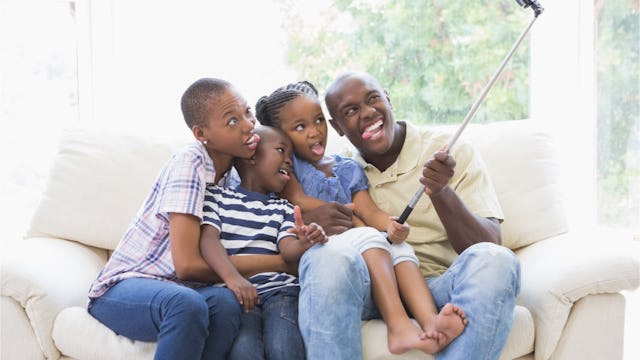Contrary To Popular Belief, Black Men Are Present And Loving Fathers

My dad has always been a hands-on dad. When I was a kid, he used to read me bedtime stories (sometimes more than one, more than once). He was home for dinner. We’d go to the playground and make special trips to McDonald’s (if Mom wasn’t home). He tried to teach me how to ride a bike and throw a football (I failed miserably, but that wasn’t his fault) and stayed up late to help me complete my science projects. He always showed up for things at school — parent/teacher conferences, class plays, dance recitals.
He cried when I graduated from high school and took us out for a farewell dinner the day I went away to college. He always supported my dreams, no matter how hard they would be to achieve. He was my biggest cheerleader.
I was a teenager before I was exposed to the commonly accepted myth that black fathers are prone to be absentee dads, missing in action from their children’s lives far more than other dads.
The news media has often presented black fatherhood in a negative light, especially in the 1970s and ’80s as drugs and poverty started to ravage the community. Black fathers were being painted as largely absent, either popping in/out of the picture or abandoning their families altogether. Never mind the fact that many of these black fathers were being taken away from their families by an unjust social system (it is well known that black men are incarcerated in higher numbers than any other ethnic group), it was just said that black men didn’t care for, and provide for, their families.
A report from the CDC was released in 2014 that proves what black people already know to be true: Black fathers are just as present and involved as fathers of other races, if not more so. While black fathers are less likely to live with their children (for some of the above-mentioned reasons) 67% of them see their kids at least once a month, unlike 59% of white and Hispanic fathers, according to the Pew Research Center. Gretchen Livingston, who is a senior researcher of family life at Pew is not surprised by the CDC report results. “Blacks look a lot like everyone else,” she said in an article by ThinkProgress.
In the CDC report, black men actually lead the pack in subjects like feeding and eating meals with children daily or reading to children daily, especially with children under 5. With children between the ages of 5 and 18, black fathers are significantly more likely to help their children daily with their homework. While the numbers may show some close similarities, it doesn’t show any major inequity for black fathers specifically in any area, and that is what may the hardest for some folks to believe. When the Los Angeles Times covered the report, they too pointed out that the stats “defy stereotypes about black fatherhood.” Because that’s all they are — stereotypes. The facts don’t lie.
All of the men in my family are loving and present fathers. Though there is no hard proof of this, one could argue that black men try much harder to be present fathers to compensate for the fathers they didn’t have, or to defy the stereotypes that their children will be faced with. I am reminded of a scene on the show Everybody Hates Chris where Chris’s white teacher assumed that he had no father simply because he was black in the 1980s.
Black fatherhood is always portrayed as “in crisis” by the news media. Many of the commercials and ads for fatherhood.com show black fathers interacting with their children as a way to perpetuate the myth. There are websites that highlight this alleged crisis along with dozens of think pieces to support their inaccurate, racist claims. But the Pew Research Center has been keeping a finger on the pulse of this research for years and finds no major differences between black and white fathers.
Dr. Roberta L. Coles, who is a sociology professor at Marquette University, has also been studying black fatherhood for many years. She has written two books on the subject, including one on single black fathers, a subject that goes largely unreported. In an interview with The Grio, she confirmed her commitment to dispelling the myth of absent black fathers. “It’s important to get it out there that that’s not the whole picture. People need to know there are men out there trying to do their best.” There is also a book called Bet On Black, compiled by Kenrya Rankin Naasel, which is a series of essays written by black women about being raised by great black fathers. “Ultimately, I hope that Bet on Black challenges the rhetoric about our families and changes the conversation to one that celebrates rather than denigrates,” she said in an interview with BET.
While (sadly) this report may come as a surprise to many people outside of the black community, it shouldn’t. Despite what the news media has presented to the public for years, black fathers are consistently showing up for their children and their families — doing their part and loving their kids. I was lucky enough to be raised by one of them.
The facts are right here. Let’s put this myth to bed in 2017, please.